#critias
Text

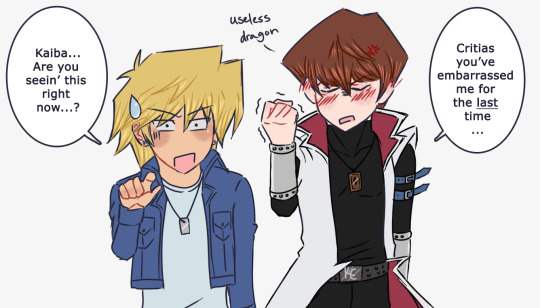
@joukaiweek 2023
Day 6: role swap || ever after
The Legendary Knights Hermos & Critias resemble their perspective card user, yet act the exact opposite of them.
#joukaiweek2023#joey wheeler#seto kaiba#jounouchi katsuya#violetshipping#puppyshipping#hermos#critias#yugioh#fanart#my art#lol this counts right i mean it is pretty much still them fhksjf#not only has their hair colors swapped funnily enough so have their personalities
163 notes
·
View notes
Text

so I ugh I cleaned this up :D (this being Theramenes' execution)
now everyone pray that mr comic editor guy I have booked a review with will say turning plato's dialogues into comics is a fantastic idea and that i'm hired. pray. pray harder.
67 notes
·
View notes
Photo

Atlantis
Atlantis is a legendary city described by the Greek philosopher Plato (c. 429 – 347 BCE). Atlantis, a fabulously wealthy and advanced civilization, was swept into the sea and lost forever in a story which has captured the imagination of readers ever since. Without archaeological evidence or substantial information from sources besides Plato, the legend poses more questions than answers.
Continue reading...
64 notes
·
View notes
Text
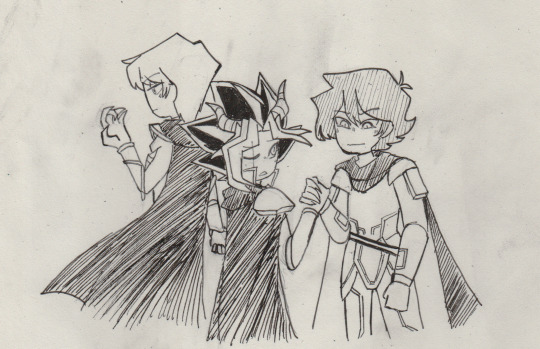
Yugioctober 2022 d14: curse
Today I offer you these guys slowly transforming into dragons
(yes I'm ignoring the canon) :3c
88 notes
·
View notes
Text
Watching Yugioh Season Four with my husband and we got to the point where Pegasus explains that the Legendary Knights were turned into dragons by Dartz to "make them weaker" and my husband lowkey lost it
Him: "I'm sorry, turning them into dragons made them weaker?! That's fucking terrifying! Who the hell were these guys?!"
Honestly, super valid point. If turning you into a dragon makes you weaker, you must have been a giga-chad to start with.
#ygo s4#legendary knights#timaeus#critias#hermos#commentary#rose talks#also wait how did Pegasus even know this???
5 notes
·
View notes
Text
I may not remember anything from ancient greek from my freshman year, but the one thing I remember clearly is when Theramenes did the sluttiest thing ever when he drunk the conium and addressed Critias like "This one is for you" and then died
#if i remember correctly what he said was like 'στην υγεία σου' (or at least that would be the translation in greek in ancient it was#probably εις υγείαν σου or something#which actually translates like 'to your health' or 'to you/for you'(at least the way he said it)#but yeah- you get the point#honestly it sounds like something that would happen in goncharov lol#goncharov#ancient greek#ancient Greece#kritias#Thiramenis#theramenes#critias#θηραμενης χ κριτιας#γουατπαντ#ιφ γιου κνοου γιου κνοου#sugarenia school stuff#sugarenia thoughts#sugarenia talks
30 notes
·
View notes
Text
I really can't stand the endless documentaries that are like "OH EM GEE WAS ATLANTIS REAL?!"
NO. IT WASN'T. PLATO ADMITTED IN HIS OWN WRITINGS IT WAS AN ALLEGORY YOU OVERFUNDED CROCKUMENTARY DINGUSES.
Allegory was practically Plato's whole thing. Short of stuffing words in Socrates' mouth (Plato basically considered Socrates to be the wisest man who ever lived and so when he wanted something to sound important or wise, he'd have Socrates say it in his dialogues), it was his favorite method of imparting a lesson. Anyone who claims to be "using Plato's writings as a map to find Atlantis" wasn't ACTUALLY reading those in the manner Plato intended and Plato would have knocked them flat on their ass for it.
Plato may have been a thinking man but he was also RIPPED and not afraid to throw hands — like many Greeks of his age he enjoyed boxing and wrestling and regularly took part in the Isthmian Games and was commented upon by several contemporaries as "a most talented grappler", so let's not pretend this man wouldn't put you on the ground if he thought you weren't getting the message.
And the message was that Plato spun a yarn about how even the greatest, most glorious civilizations can so completely fail and give way to the basest, darkest parts of human nature and decline so far that when the end comes for them, it is not a tragedy, but rather a blessing. The whole point of the Allegory of Atlantis is that they had their chance and they're better off dead, and you should NOT seek to be like them BECAUSE they failed.
In short: "If they were worth emulating, they would still be here. They are neither."
Despite occurring nearly a thousand years earlier, the story of the destruction of the isle of Thera and its golden city of Akrotiri by volcanic apocalypse would have been known to men of Plato's generation (an island effectively deleting itself off the map in a single massive —never mind DRAMATIC— explosion, darkening the skies for miles around, cooling the climate, and wiping out one of the most technologically advanced, wealthy, and prosperous societies to have ever existed in the region is not the sort of thing people in the area tend to just... forget, after all), and since volcanoes would not be even slightly understood until after Pompeii and Herculaneum, the only reasoned explanation at Plato's time would have been "the gods did it", and if the gods did it, they must have had a reason for it, even if that reason was not visible to us mere mortals, and it's from those considerations that the Allegory of Atlantis springs.
As Plato writes in Critias of the destruction of "Atlantis":
By such reflections and by the continuance in them of a divine nature, the qualities which we have described grew and increased among them; but when the divine portion began to fade away, and became diluted too often and too much with the mortal admixture, and the human nature got the upper hand, they then, being unable to bear their fortune, behaved unseemly, and to him who had an eye to see grew visibly debased, for they were losing the fairest of their precious gifts; but to those who had no eye to see the true happiness, they appeared glorious and blessed at the very time when they were full of avarice and unrighteous power.
Zeus, the god of gods, who rules according to law, and is able to see into such things, perceiving that an honorable race was in a woeful plight, and wanting to inflict punishment on them, that they might be chastened and improve, collected all the gods into their most holy habitation, which, being placed in the center of the world, beholds all created things.
We can see Plato's general point summed up in that quote: the people of Atlantis were a good people, a hard working people, and ascended greatly as they emulated that which was best about man and the gods (aka Plato's values), and declined as they ceased to cherish what Plato believed was good and embraced what he considered evil, until they became so fallen, so depraved, and had committed such crimes that Zeus, "who rules according to law", was forced to pass judgment upon and destroy them "in a single day and night of misfortune".
Atlantis was an allegory for how even the mightiest and most virtuous of civilizations can fall prey to the temptations of decadence and pride if your own pride is not paired with self-vigilance. The people of Atlantis were at one time prosperous, virtuous, and rightly proud. But they let their pride get the better of them. They became selfish and overconfident, they let the darker side of human nature rule them.
Plato considered it righteous for the gods to “reward” the selfish and the careless with just vengeance. "When all their pride has been shattered", the principle argues, "they can return to a better, earlier form of what they used to be."
The most illustrative demonstration of Atlantean wickedness and decadence is this line:
To those who had no eye to see the true happiness, they appeared glorious and blessed at the very time when they were full of avarice and unrighteous power.
It's like looking at <spins the wheel of pop culture dystopia> the Capital of Panem from "The Hunger Games" and deciding that since it's full of extravagant fashion, beautiful architecture, and sumptuous foods and everyone is partying constantly, that this is a fundamentally good and happy society. But they aren't. They are prisoners of their own oppressive system and their need to maintain it to keep the status quo preserved, they are slaves to their greed and chronic consumption, and all the selfish and excessive pleasures, all glitz and the glamor, cannot cover up the massive collective void in their society's hearts. The Capital and everyone in it is DEEPLY unhappy and is simply covering it up with more and more surface level comforts and hedonism, trying to "consume away" the pain at the expense of others they have oppressed and effectively enslaved, while their leaders are no happier, unable to enjoy the fruits of their decades of labor establishing their nation, as they know how fragile the house of cards really is, and all fear the backstabbing schemes of others in the leadership structure, with none more feared and fearful than the "King" at the very top, which ends up resulting in the destruction of everything he and those before him have built, and his own personal death as well.
THAT is Atlantis. Atlantis is exactly as real as Panem's Capital. And Atlantis is the same kind of story: a corrupt and wicked dystopia, a once shining society brought low by the worst aspects of human nature, and utterly deserving the destruction wrought upon it.
If Plato were here today, he'd probably say something like "Seek not Atlantis, for you will find nothing — nothing but a tale of man's own inclination towards self-ruin."
8 notes
·
View notes
Text
So here I am reading about Ancient Greece and out of nowhere I find an exciting and new slam against Robespierre! Being compared to Critias of Thirty Tyrants fame, no less! Jesus Maxime you really can’t catch a break can you
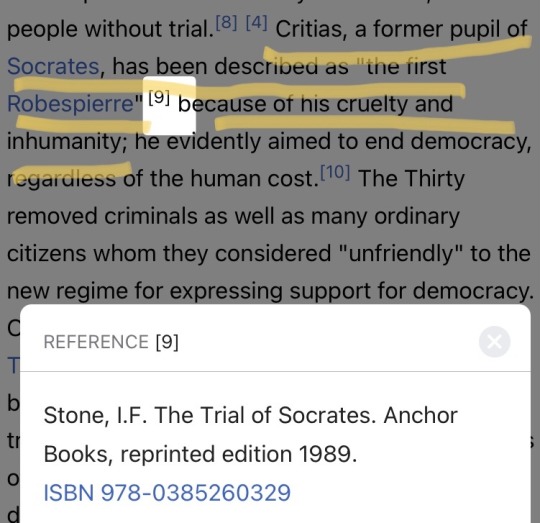
7 notes
·
View notes
Note
Timaeus, Critias, and Hermos: 3 tickets to the Barbie movie, please.
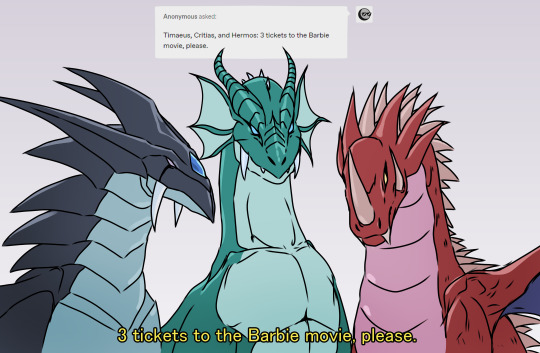
57 notes
·
View notes
Link
Right after defeating Dartz and the Great Leviathan, the Legendary knights return to Earth, and decide to have a conversation with their chosen Duelists. Somehow, this leads into various revelations, and some very complicated arguments.
Today’s fic for @rainstormcolors's Super Yu-Gi-Oh! Rarepair Week (yeah I posted another link today, but it was for yesterday’s fic that i posted too late, sorry there). It is a Legendaryshipping fic (that is Timaeus/Critias/Hermos).
3 notes
·
View notes
Text

#sixcharacter#fan art#ygo#le passe miroir#jojo's bizarre adventure#slam dunk#amelda#king farouk#dio brando#sakuragi hanamichi#critias#yugi mutou#sixfanarts
29 notes
·
View notes
Text


The Legendary Knights of Spirit world: Timeaus, Hermos, & Critias
#yugioh#ygo#timaeus#hermos#critias#fanart#my art#goodness gracious i hated this arc but it did spark some ideas#went with a greekish vibe since that seems like the appropriate theme with them#i had to doodle them real quick#i shouldve added scales since theyre dragons but im tired lol this is good enough
36 notes
·
View notes
Text

The execution of Theramenes.
(this one's for you @whatifwekilledgodandwebothgirls because you were right about the theramenes exclusion. I hope you will accept this token of my remorse)
#ancient greece#tagamemnon#art#critias#theramenes#I want theramenes' last words to be a form of psychological warfare#like he used to call critias beautiful all the time like every day#and then as the years passed and stuff happened he stopped and they broke up and stuff#and critias hadn't heard him say it in like years#and then waah
54 notes
·
View notes
Text
The thing about Atlantis is the the very notion that it is some old Greek Myth like the Trojan War that might contain some truth about it -relies on completely ignoring the context it appears in.-
It's not in Hesiod. Or mentioned in a play by Aeschylus. Or even recorded in a later form by Ovid (who to be fair had his own reasons for telling stories like he did and wasn't just recounting oral tradition, but then neither was Aeschylus). Atlantis is only mentioned on the works of Plato, a philosopher concerned with the true nature of knowledge, the most just regime for the state, and the nature of reality. Normal Philosopher Stuff. He was not a collector of legends, he was an inventor of allegories. And when he recounts the story of Atlantis (twice) it is very clear that this is what he is doing. He introduces it as an illustration of his political ideas, to show his ideal state at war. He sets up a backstory that is basically 'long ago and far away.' And then he yells a story -that we have no other record of-. And Plato does this ALL THE TIME. For instance, on the Symposium we get the comic poet Aristophanes telling and absurd yet heartfelt creation story where human beings used to be four arm, four legged round creatures that rolled everywhere until Zeus chopped us apart, and now we erotically long for our other half. This isn't an old Greek Myth about love. It is a presentation of a certain perspective on the nature of love, or at least what it feels like. Later in the dialog Diotima shares Ancient Egyptian wisdom with Socrates about the desire for the Good, a Nugget of ancient wisdom that just happens to sound like what Socrates says at the end of about 50% of other Platonic dialogs. And these are straightforward examples. The Dialogs are philosophical plays, convoluted dramatizations of the search for truth with multiple layers of unreliable narration and allegory and irony. Nothing in them is meant to be taken literally.
And the story if Atlantis is like this. It comes up in the Timeus when it is posited that in order to understand the perfect city from Plato's previous dialog, the Republic, the people gathered must see the perfect city at war. And that is when the tale is spun of an impossibly ancient Athens that looks a lot like the Republic fighting a hubrisitic empire from beyond the known world. The allegory is clear in the framing.
Anyway it's a shame that people, if they look at these Dialogs at all, will only mine them for 'evidence' of their theories and not read them for themselves and see what they have to say. Taken like this, on their own terms, they are fascinating and infuriating. But then again books are always better when we let them be themselves.
7 notes
·
View notes
Text
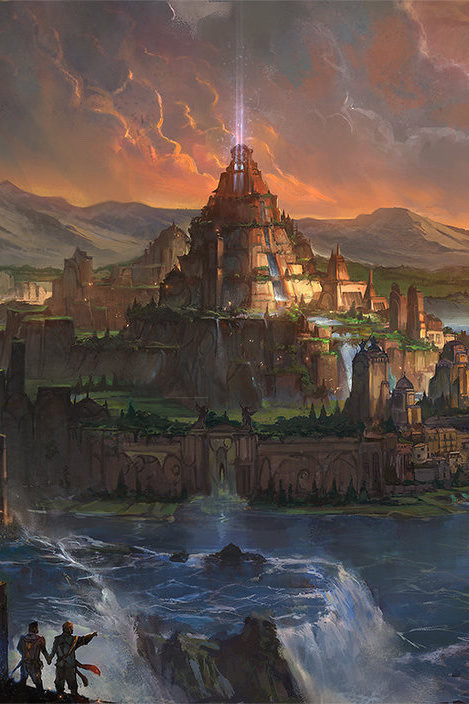
#archaeology#adventure#travel#adventure gear#travel gear#planetary defense#visions of atlantis#Plato#timaeus#Critias#Atlantis#flood myth#deluge myth#lost civilization#science of Atlantis
9 notes
·
View notes
Note
What do you mean by "Atlantean spirituality" and what did Plato say about Atlantis and Egypt?
I mean modes of spirituality allegedly practiced in Atlantis. As to what Plato said, you can read it for yourself in Timaeus and Critias.
8 notes
·
View notes